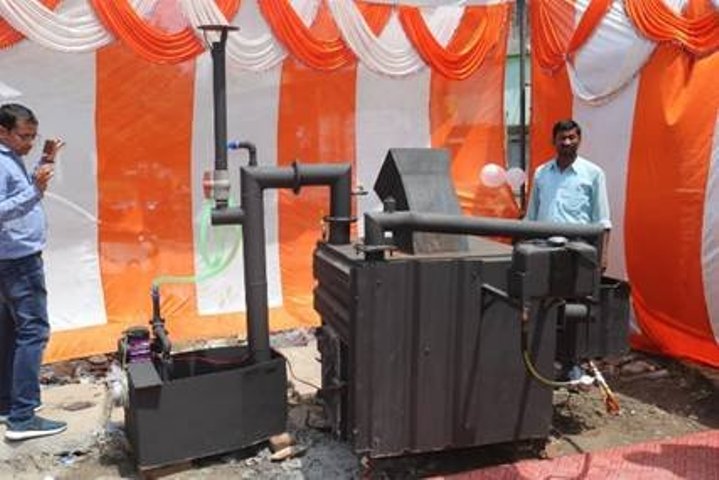Decentralized biomedical waste incinerator inaugurated at Buxar in Bihar
The waste heat recovery will be undertaken from the hot gas for any productive application near the site of installation.

- Country:
- India
Principal Scientific Adviser to the Government of India Prof. K. Vijay Raghavan virtually inaugurated a decentralized biomedical waste incinerator at Buxar Municipality, Bihar. The technology developed by Ganesh Engineering Works was selected through the Biomedical Waste Treatment Innovation Challenge launched in June 2020 by the Waste to Wealth Mission. The mission is one of the nine scientific missions of the Prime Minister’s Science, Technology, and Innovation Advisory Council (PM-STIAC) and is spearheaded by the Office of the Principal Scientific Adviser to the Government of India.
The pilot installed in Buxar is a portable, forced draft incinerator capable to handle 50 kg of biomedical waste made of cotton, plastic, or similar materials per hour (5kg per batch), with the provision of waste heat recovery. The unit requires a two square meter area and requires only 0.6 kWh electricity for initial ignition of the waste with an option of auto electricity turn off.
The waste heat recovery will be undertaken from the hot gas for any productive application near the site of installation. Different types of waste heat end products will be tested during the pilot at different sites like distilled water, steam, hot water, gas burning, etc. Efforts will be taken for best utilization of the technology in residential or public places ensuring zero smoke, chimney usages, compact system, plasma (spark) burning, waste heat recovery, etc.
The problem associated with handling and disposal of biomedical waste is exacerbated due to the COVID-19 pandemic in small towns and villages which do not have access to central biomedical waste treatment facilities. Understanding the need for decentralized technologies for waste disposal, the Biomedical Waste Treatment Innovation Challenge by the waste to Wealth Mission invited technology applications from start-ups, corporates, and entrepreneurs from research institutions to address the challenges of safe collection, disposal/treatment of large volumes of bio-medical waste being generated during the ongoing COVID-19 pandemic. 460 applications were received from all over the country and three technologies were finally selected for piloting. These technologies will be evaluated for further scale-up in the specific context depending on the results by continuous Monitoring & Evaluation by the local administration. The M&E data would be available on Waste-to-Wealth Mission (portal) dashboard.
Inaugurating a decentralized biomedical waste incinerator Prof. K.Vijay Raghavan, Principal Scientific Adviser to the Government of India, laid down future directions for technology refinement and said, “It is very heartening that Ganesh Engineering, a startup based in Buxar has been able to develop a decentralized biomedical waste incinerator. I would like to thank BuxarDistrict Administration for their help and cooperation. Going forward it is important that Ganesh Engineering use insights from the operational phase and further refine their technology and explore manufacturing partnerships for scale-up.”
Mr Ajay Chaubey, Adviser, Buxar Nagar Parishad, said, “It is a matter of pride that a Buxar based company has developed this system indigenously. The system can be easily installed at the source of waste and efficiently treat waste while saving on transportation and labour costs.”
Ganesh Engineering Works, an MNRE-approved manufacturer of biomass gasification-based power generation systems based in Buxar, will operate and maintain the pilot for three months after which Buxar District Administration would take over the operation of the unit. Monitoring and evaluation of the pilot would be done by Buxar District Administration and the Waste to Wealth Mission of the Office of the Principal Scientific Adviser to the Government of India.
(With Inputs from PIB)
- READ MORE ON:
- Vijay Raghavan
- biomedical waste
- Buxar










